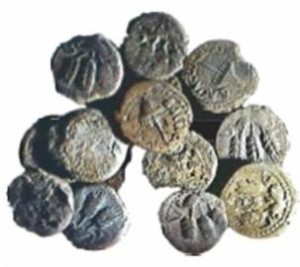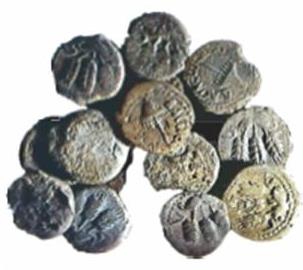 The action begins with a preliminary hearing before the Imperial Council, the Consilium Caesaris (symboulion in Greek), on the fifth of Pachon, the day before the Calends of May, i.e., April 30. The year has not been conserved but we may assume it was the first of Emperor Cladius’ (e.g. 41 C.E. – 54 C.E.) reign, 41 C.E. The object of the hearing is to examine the admissibility of the criminal suit the gymnasiarch Isidoros of Alexandria had brought before the imperial court against the Jewish King Agrippa I and, in the king’s person, against the Jewish people. The accusation was a weighty one: the Jews and their separatism had been charged with endangering the very foundations of the Roman Empire.
The action begins with a preliminary hearing before the Imperial Council, the Consilium Caesaris (symboulion in Greek), on the fifth of Pachon, the day before the Calends of May, i.e., April 30. The year has not been conserved but we may assume it was the first of Emperor Cladius’ (e.g. 41 C.E. – 54 C.E.) reign, 41 C.E. The object of the hearing is to examine the admissibility of the criminal suit the gymnasiarch Isidoros of Alexandria had brought before the imperial court against the Jewish King Agrippa I and, in the king’s person, against the Jewish people. The accusation was a weighty one: the Jews and their separatism had been charged with endangering the very foundations of the Roman Empire.
As for the accused, King Agrippa, he is known to us by Philo (Against Flaccus) and Josephus (Jewish Antiquities), who has described him in elaborate detail. He was the grandson of Herod the Great, friend of Marcus Vipsanius Agrippa, the son-in-law of Augustus, and great-grandson of Antipater the Idumaean, upon whom Julius Caesar had conferred Roman citizenship, and whom he appointed financial administrator of Judaea. He had been reared in Rome, where he was the favorite, first of Caligula and then of Claudius, whose bloodless accession to the throne he had facilitated. During his brief reign, the Christians were persecuted in order to reassure the Pharisees: following in the footsteps of his grandfather, Herod, who had given the order for the Massacre of the Innocents, and his uncle Antipas, who had ordered the execution of John the Baptist and mocked Jesus, Agrippa ordered that Peter be imprisoned and James beheaded. He left the traces of a more glorious endeavor in the unfinished construction of a new wall to the north of Jerusalem, which Hadrian completed for the Roman town Aelia Capitolina, built on the ruins of the Holy City; later on, Suleiman the magnificent was to use it as a foundation for his ramparts. Josephus scrupulously set down in great detail the brief but cruel period of suffering that preceded Agrippa’s death at the age of 54, in the year 44 C.E.
In the spring of the year 41 Agrippa was in Rome, preparing to take possession of his kingdom, which Claudius had enlarged to the dimensions it had under the reign of Herod the Great. For Isidoros, to indict Agrippa at that time was an act of bravery, if not a deliberate provocation. Claudius was quite unenthusiastic about the accusation and would have gladly postponed the proceedings indefinitely. But Isidoros and his party of “radical” Alexandrians had some supporters in Rome, and two senators, members of the Council, intervened in his favor. One of them drew the Emperor’s attention to the “ecumenical” gravity of the charges. He stressed the patriotic character of Isidoros’ action and solicited a just hearing. He insisted upon the disadvantages attending the exclusion of the members of the delegation, which included Isidoros, from the proceedings. The Emperor heeded this counsel and announced that he would hear the Alexandrian delegation the next day.
On the sixth of Pachon, the Calends of May, Claudius heard the action brought by the gymnasiarch Isidoros against King Agrippa. The second day of the proceedings can be reconstructed from two concordant papyri. Their combined interpretation affords us an excellent picture of the otherwise little-known workings of the imperial jurisdiction (Caesariana cognitio). The hearings took place in the imperial gardens, with the Emperor seated in the midst of his Council. The ladies of the court assisted, as spectators. The dialogue between Claudius and Isidoros rapidly took on a polemic note:
Berlin Papyrus II 551 and London Papyrus Inv. 2785; CPJUD. II 156A, Col. 2, and 156C, Col. 1
The sixth day of Pachon: the second day. Claudius Caesar Augustus hears the case of Isidoros, gymnasiarch of Alexandria versus King Agrippa in the … gardens. With him sat twenty senators, among which sixteen men of consular rank; the women of the court also attending … Isidoros’ trial.
Isidoros was the first to speak: “My Lord Caesar, I beseech you to listen to my account of my native city’s sufferings.”
The emperor: “I shall grant you this day.”
Source: Joseph Mélèze Modrzejewski. The Jews of Egypt. (p. 172-173, 175-179, 182-183)
